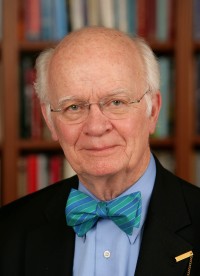Bipartisan sins: Ideologies and scandal
Let's institute a moratorium on citing the sexual (or fiscal) indiscretions of various leaders and linking their misdeeds to the individuals' ideology, whether of the left or right.
The occasion for this call is the sad story of George Roche III, president of Hillsdale College. Roche took a tiny, struggling liberal arts college in Michigan and by force of personality and ideology turned it into a well-endowed and highly noticed conservative school, which stresses the teaching of traditional moral values. One example of his idealistic brand of conservatism, which made Hillsdale a conservative showpiece: he forbade the school or its students from accepting federal funds. Donors lined up on the right.
Publications of many sorts emanated from Hillsdale, notably the newsletter Imprimis, which spread the philosophy of Hillsdale to a mailing list of 900,000. The managing editor was Lissa Roche, daughter-in-law of the president and mother of his grandchild.
Several weeks ago, Lissa Roche committed suicide after revealing that she had had a 19-year sexual affair with her father-in-law. The college's trustees accepted the president's resignation but gave him a nice financial package and avoided discussing the suicide and scandal.
One of the school's very prominent supporters has been William Bennett, talk-show regular and author of The Book of Virtues. Bennett found the trustees' tight-lipped approach to the scandal so distasteful that he very publicly resigned from the search committee for a new president and distanced himself from the school. Another conservative luminary, William F. Buckley Jr., stayed on the search committee and put the best possible spin on the events and the board's action.
Buckley's magazine, the National Review, to its credit published the fullest account of the "Horror at Hillsdale." Buckley himself, however, offered a comment that prompts this call for a moratorium. "It is predictable that there will be moral and ideological clucking by those who scorn the very idea of Hillsdale." He went on to say that "the achievements of Mr. Roche . . . rankle those who feel that education is insecure except in the hands of academicians and administrators who are intellectually and morally adrift." Buckley also argued that we must accept Roche's sworn word that he is innocent, for he is a "practicing Christian," and "fellow Christians should accept the formal implications of his pleading."
No doubt there has been some of the clucking that Buckley anticipated. But first into print were some attempts on the right to minimize the episode. My favorite was Roger Kimball's ingenious attempt in the Wall Street Journal (November 22) to say that Roche's offense was not as bad as those of many others because he is mainly charged with being a hypocrite, and hypocrisy is better than some other vices. "That is because hypocrisy is essentially an aristocratic failing. It extols 'the best' even if the best is generally unattainable. This is one reason that hypocrisy, among all the vices, is regarded with particular disdain and horror by egalitarians."
The clucker in me wants to respond: Buckley does not ask for such charity when someone on the left is indiscreet, and Kimball is not likely to defend hypocrisy on the left. But having sneaked in that remark, I will refrain, and get back to the idea of a moratorium.
A few years ago historian and moralist Paul Johnson chronicled the moral flaws, some of them cosmic, of great thinkers in a book called Intellectuals. It was clear that most of these faltering, even evil, intellectuals were of the left. Johnson followed up with other books that attacked liberals for their departure from the honor and virtue that Roche touted.
Many of us not on the right have winced at the failings of liberal allies or heroes. And we got used to hearing that it is liberal theology or liberal politics that leads people off the straight and narrow—an argument we heard when Paul Tillich's wife published two books about their life together, and when the FBI leaked word of some after-hour activities of Martin Luther King Jr.
I confess that I have clucked in secret whenever accusers are revealed as guilty of the same mistakes they charge others with—as when Paul Johnson himself was exposed as having had an adulterous relationship. Such partisan clucking was a national activity during the Bill Clinton-Monica Lewinsky-Robert Livingston-Henry Hyde scandals.
The moratorium I call for does not entail covering up the suffering of the victims, those wounded by moral failings. Least of all should it lead to further moral relativism or excuse-making.
The moratorium I call for is this: those on the left and right, liberals and conservatives, modernists and mossbacks, virtuecrats and relativizers alike will stop identifying evil, sin, hypocrisy or perversity as the natural outgrowth of the ideology of "the other." We have learned by now that evil takes root in every heart and can flower in the most unexpected places. Sin is original and people find original ways to activate it. Hypocrisy is anything but aristocratic; it emerges from the slime. Perversity is perversity, in all its nonpartisan and bipartisan shabbiness.
Cleared of the ideological clucking which Buckley anticipated but to which he contributed, and of the clucking I indulged in above, we might be free to celebrate the honor and virtue which so many people, high and low, across the ideological spectrum, embody and exemplify against all odds.






